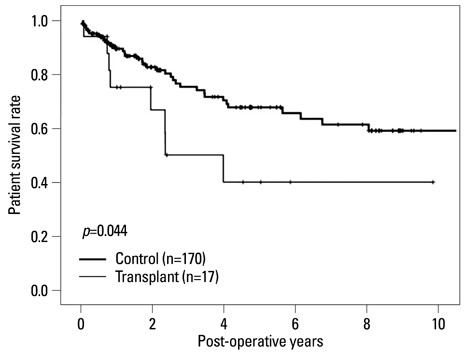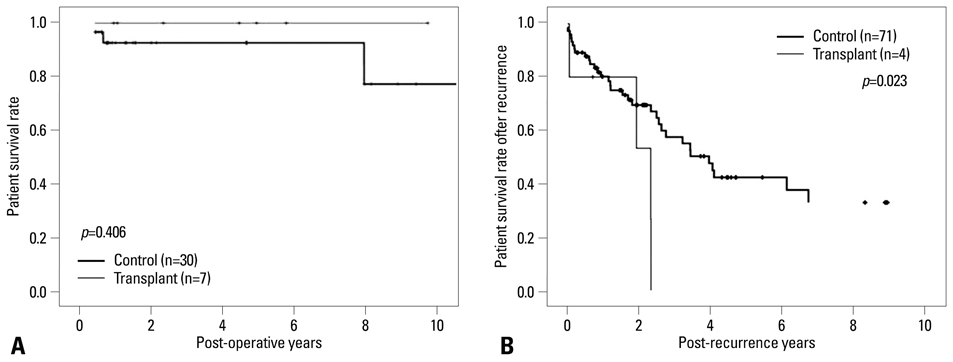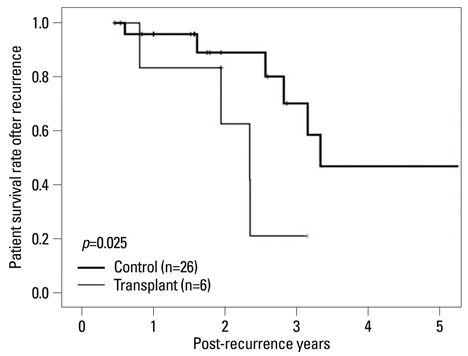Yonsei Med J.
2011 May;52(3):454-462. 10.3349/ymj.2011.52.3.454.
Clinical Characteristics and Treatment Outcomes of Colorectal Cancer in Renal Transplant Recipients in Korea
- Affiliations
-
- 1Department of Surgery, Hangang Sacred Heart Hospital, College of Medicine, Hallym University, Seoul, Korea.
- 2Department of Surgery, Yonsei University College of Medicine, Seoul, Korea. ysms91@yuhs.ac
- 3the Research Institute for Transplantation, Yonsei University College of Medicine, Seoul, Korea.
- KMID: 1777017
- DOI: http://doi.org/10.3349/ymj.2011.52.3.454
Abstract
- PURPOSE
Transplant recipients in Asia appear to be at a higher risk for developing colorectal cancer (CRC). This study was performed to identify the clinicopathological features and oncologic outcomes of CRC in post-renal transplants in Korea.
MATERIALS AND METHODS
We retrospectively reviewed the records of 17 patients with CRC out of 2,630 recipients who underwent renal transplantation between 1994 and 2007. These patients (transplant group) were compared with general CRC patients (n=170, control group) matched, based on the closest date of surgery to the transplant group.
RESULTS
During 29.7 months of the median follow-up period, the recurrent and survival rates from recurrence were worse in the transplant group than in the control group (35.2% versus 15.2%; p=0.048 and p=0.025). The 2-year patient survival rate of the transplant group was significantly worse than the control group in advanced cancer (stages III-IV; 45.7% versus 71.6%; p=0.023). In early cancer (stages 0-I), there was no significant difference in 5-year patient survival rate between the two groups (100% versus 92.6%, respectively; p=0.406).
CONCLUSION
In spite of a poor prognosis of advanced CRC in the transplant group, the early stage CRC of the transplant group showed a comparable oncologic outcome compared with the control group. Regular screening and early detection of CRC are essential in the post-transplant setting.
MeSH Terms
Figure
Reference
-
1. Hariharan S, Johnson CP, Bresnahan BA, Taranto SE, McIntosh MJ, Stablein D. Improved graft survival after renal transplantation in the United States, 1988 to 1996. N Engl J Med. 2000. 342:605–612.
Article2. Kauffman HM, Cherikh WS, McBride MA, Cheng Y, Hanto DW. Post-transplant de novo malignancies in renal transplant recipients: the past and present. Transpl Int. 2006. 19:607–620.
Article3. Adami J, Gäbel H, Lindelöf B, Ekström K, Rydh B, Glimelius B, et al. Cancer risk following organ transplantation: a nationwide cohort study in Sweden. Br J Cancer. 2003. 89:1221–1227.
Article4. Advisory committee to the renal transplant registry. The 13th report of the human renal transplant registry. Transplant Proc. 1977. 9:9–26.5. Penn I. Malignancies associated with immunosuppressive or cytotoxic therapy. Surgery. 1978. 83:492–502.6. Vajdic CM, McDonald SP, McCredie MR, van Leeuwen MT, Stewart JH, Law M, et al. Cancer incidence before and after kidney transplantation. JAMA. 2006. 296:2823–2831.
Article7. Buell JF, Husted T, Hanaway MJ, Peddi VR, Trofe J, Gross TG, et al. Incidental diagnosis of gastric cancer in transplant recipients improves patient survival. Surgery. 2002. 132:754–758.
Article8. Choi DJ, Hyung WJ, Kwon KH, Kim SI, Kim YS, Noh SH, et al. Gastric Adenocarcinoma after Renal Transplantation. J Korean Surg Soc. 2003. 64:201–205.9. Kan M, Gill JS, Wiseman SM. Colon and rectal cancer after renal transplantation. Expert Rev Anticancer Ther. 2008. 8:1339–1346.
Article10. Kasiske BL, Snyder JJ, Gilbertson DT, Wang C. Cancer after kidney transplantation in the United States. Am J Transplant. 2004. 4:905–913.
Article11. Villeneuve PJ, Schaubel DE, Fenton SS, Shepherd FA, Jiang Y, Mao Y. Cancer incidence among Canadian kidney transplant recipients. Am J Transplant. 2007. 7:941–948.
Article12. Hoshida Y, Aozasa K. Malignancies in organ transplant recipients. Pathol Int. 2004. 54:649–658.
Article13. Ro H, Kim SM, Kim KW, Hwang YH, Yang JS, Oh KH, et al. Malignancy after kidney transplantation. J Korean Soc Transplant. 2006. 20:187–192.14. Kim NK. Anatomic basis of sharp pelvic dissection for curative resection of rectal cancer. Yonsei Med J. 2005. 46:737–749.
Article15. Kim NK, Baik SH, Seong JS, Kim H, Roh JK, Lee KY, et al. Oncologic outcomes after neoadjuvant chemoradiation followed by curative resection with tumor-specific mesorectal excision for fixed locally advanced rectal cancer: Impact of postirradiated pathologic downstaging on local recurrence and survival. Ann Surg. 2006. 244:1024–1030.
Article16. Stewart T, Henderson R, Grayson H, Opelz G. Reduced incidence of rectal cancer, compared to gastric and colonic cancer, in a population of 73,076 men and women chronically immunosuppressed. Clin Cancer Res. 1997. 3:51–55.17. Parikshak M, Pawlak SE, Eggenberger JC, Lee CS, Szilagy EJ, Margolin DA. The role of endoscopic colon surveillance in the transplant population. Dis Colon Rectum. 2002. 45:1655–1660.
Article18. Feng S, Buell JF, Chari RS, DiMaio JM, Hanto DW. Tumors and transplantation: The 2003 Third Annual ASTS State-of-the-Art Winter Symposium. Am J Transplant. 2003. 3:1481–1487.
Article19. Hawk ET, Umar A, Richmond E, Viner JL. Prevention and therapy of colorectal cancer. Med Clin North Am. 2005. 89:85–110.
Article20. Mano MS, Duhoux F. Colon cancer: update on adjuvant therapy. Clin Colorectal Cancer. 2008. 7:178–183.
Article21. Lynch HT, de la Chapelle A. Hereditary colorectal cancer. N Engl J Med. 2003. 348:919–932.
Article22. Screening for breast cancer: recommendations and rationale. Ann Intern Med. 2002. 137:344–346.23. The National Comprehensive Cancer Network (NCCN). Cancer Institute. http://www.glci.com/body.cfm?id=243.24. Ju MK, Joo DJ, Kim SJ, Huh KH, Kim MS, Jeon KO, et al. Chronologically different incidences of post-transplant malignancies in renal transplant recipients: single center experience. Transpl Int. 2009. 22:644–653.
Article
- Full Text Links
- Actions
-
Cited
- CITED
-
- Close
- Share
- Similar articles
-
- Malignancy in Renal Transplant Recipients
- Clinical characteristics and outcome in renal transplant recipients with bladder cancer
- Prognostic Value of Ambulatory Status at Transplant in Older Heart Transplant Recipients: Implications for Organ Allocation Policy
- Clinical characteristics and outcomes in renal transplant recipients with renal cell carcinoma in the native kidney
- Endoscopic features of cytomegalovirus disease of the upper gastrointestinal tract between transplant and non-transplant patients





